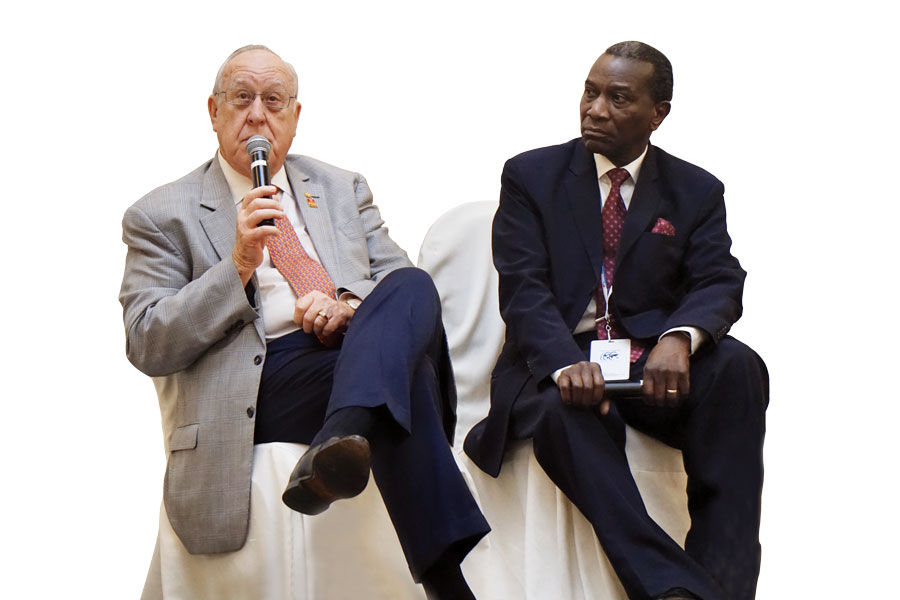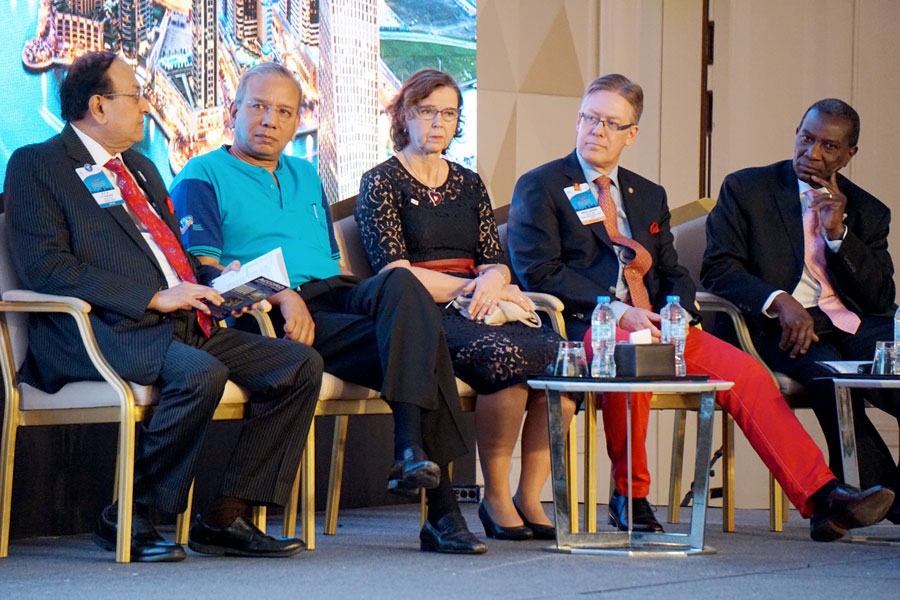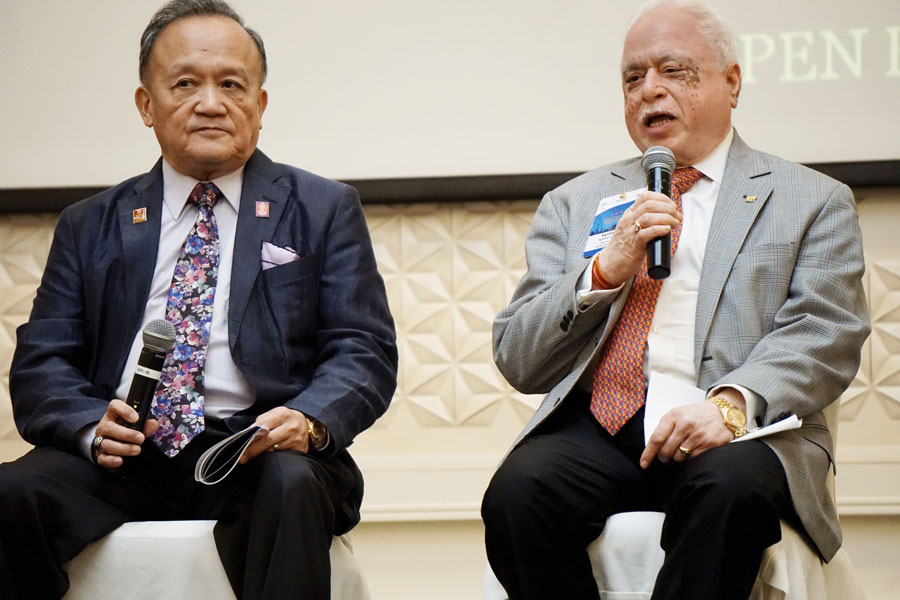
In a lively and frank session on the future of Rotary at the Dubai Zone Institute, IPRIP K R Ravindran asked some searching questions to both RI President John Germ and RIPN Sam Owori.
Disclosing that Germ was the one who had been instrumental at Rotary International in negotiating partnerships, Ravindran asked him about the importance of future partnerships, particularly with some of the big philanthropist organisations. Would it be okay to compromise some of the recognition that Rotary was entitled to through such partnerships?
“Yes, it is absolutely important to work with partners. I believe working with the Bill Gates Foundation has enhanced both the image and strengths of Rotary,” replied Germ. Gates had said that such a huge movement forward on polio would not have been possible “if Rotary didn’t have boots on the ground, and I would say his money helped too!” The partnership with USAIDS was also very important. “All the organisations we work with value our partnership. I had a meeting with the Gates Foundation recently and Bill Gates will be in Atlanta and we will be announcing a new partnership with them soon,” he said.
Rotary is giving up some credit by partnering with other organisations, but that’s okay. We cannot dothis by ourselves, and will have to work with others.
— RI President John Germ
He added that seeing the success a partnership with Rotary entailed, many organisations “want to partner with us. And there are so many needs out there. Just think of how we can multiply our efforts by adding people. As for credit, I’ve always said if we don’t care who gets the credit, a lot more can be done. Yes, Rotary is giving up some of the credit by partnering with other organisations, but that’s okay and we have to face the fact that we cannot do this by ourselves, and will have to work with others if we want to keep serving humanity.”

Ravindran had the entire audience sitting up and listening, smiling, and chuckling too with his next question directed at RIPN Owori. “We are managed by this huge building in Evanston but if you see the membership graph in the world, all the arrows are up in our part of the world, but going down in the US and Europe. Do you think it would be a good idea to move the RI headquarters to Singapore, Delhi or Seoul?” And, decentralise the management, “maybe give $15 million to Africa, $25 million to South Asia,” and ask them to manage Rotary affairs in their region. But laying down guidelines on how projects must be costed, run, on stewardship, etc.
Owori replied it couldn’t be denied that there was merit in getting close to the scene and decentralising had the benefit of demystifying the organisation, so people could relate more closely to what Rotary does, “as many people in many parts of the world don’t get to meet people like you (Ravindran) or John except for an occasional visit.”
Quality and numbers are not mutually exclusive. If we invite the right people, we’ll never have a problem about quality.
— RIPN Sam Owori
But while decentralising RI “might create more excitement, we need to look at the issue a little more closely to see what decentralisation means in terms of efficiency, resources utilised and what would be lost by it.” He was not sure if the Rotary headquarters in Evanston could be duplicated at the regional level.
“So, in the short term, I am not sure. But in the long term yes,” Owori said. He added that the benefits of doing so would have to be analysed; these could be more convenience, RI’s presence at the grassroots might be more exciting to the people “as Rotary is growing in India and Africa”, but the regional centres would need support for that growth to be sustained.
Ravindran next quizzed the RI President on the RIBI, the way it worked and if it was successful then why weren’t there more regional organisations, “such as an India-Pakistan association or something like that.”
Germ’s caustic reply: “If you want to destroy Rotary, go ahead and do it. RIBI is a failure; it was set up as a separate organisation but it is not working. In 2004, when I was the RI Director, RIBI had 75,000 members; right now, the membership is down to about 48,000 members. The members are ageing, the average age of members is 74, younger people aren’t joining because they don’t see value, the dues are extremely high.”
There was a very strong possibility of RIBI being disbanded in the next CoL or the one after that in 2022, he added.
Replying to his next question on Africa, once the dark continent, but which now holds a lot of promise for Rotary, as it has potential for both membership as well as good projects, Owori said, “Yes it was a dark continent, still is to some extent, and will remain so for some time.” But it was a region of growth; “we have one billion people. It’s a huge continent and Rotary is needed here the most.”
Answering another question on whether Rotary should aim at increasing membership even at the cost of quality, as was often seen, Germ replied, “Sometimes we put too much emphasis on adding numbers and not getting the individuals who will have high ethical character on which Rotary was founded.”
US was not growing, but now it has begun to; Japan and Korea were no longer growing as fast as they were earlier, and sometimes this was due to tradition, such as “in Europe they are very strict with rules. But the crucial thing is you can only become a Rotarian if someone invites you to become one. We have to go and find the right person for our clubs. We have to take that responsibility. Too many times we take in whoever wants to come because we need members, but just because you need financial income you can’t destroy the organisation.
I think only people with high integrity and character, those who believe in the Four-way test and can pass it, will strengthen this organisation.”
Owori added that quality and numbers were not mutually exclusive. Rotary membership was by invitation; “if we invite the right people, people with ethical standards and values we cherish, we’ll never have a problem about quality.”
Ravindran added, “Sam, what you say is true in theory, but the (RI) Board is aware of cases of fictitious clubs and members who don’t exist.”
To this Owori quipped: “Then the problem is us, the existing Rotarians.”
Germ was even more caustic: “Fictitious membership goes back to the leadership in the area, because there are checks and balances in the system. The name of the person who proposes is published in the local club publication. So it tells me that the president of the club is an immoral person if he has got fictitious members. Number two, the board of the club is not doing its job and saying these are fake members.” Showing more members than actually existed just to garner more votes is “immoral and unethical,” he added forcefully.
The future of Rotary, added Germ, is “very bright. The last CoL has allowed flexibility, and “we are having continuity at the Board level and the regional leadership level, and we’ll see that the training we do, the exercises we go through will make us stronger.”
In the session ‘Great Opportunity’, TRF Trustee Sushil Gupta, quizzed TRF Trustee Representative Gary Huang on what plans TRF had to leverage the good work Rotary was doing across the world to improve its public image. “We are ‘this close’ to ending polio and when that job is finished, we have to make sure we are remembered for it. Since we spend a lot of time, energy and our money to do good in the world, we need to make sure that all this attracts new members to join us.”
The biggest challenge in the short term would be choosing the right partners, he said.
On how Rotary will choose its partners, Gupta said, “We will have to see what the partner can bring to the table. My biggest strength is boots on the ground. Rotary is present almost in all parts of the world, so we do have a choice; whoever adds to our strength will be our partner. It is a business decision; we are working on 10 to 12 leads.”
When asked if Rotary chooses a partner who is bigger or better known, will not its voice get drowned, the TRF Trustee said, “That is immaterial. What is important is are we going to eradicate polio or not, not who is getting more mileage.”
Answering a question from a DGE on why CSR funds should be routed through TRF and as global grants when the CSR partner was ready to do it directly with the club or the district, Gupta said, “Because TRF is known for its integrity, it is important that we address every concern of our CSR partner. If those funds are not used judiciously and with proper stewardship, what happens? We will lose the partner for all time.”
So, it was necessary to ensure that the system that had been created is followed.
He added, “You’ll be shocked to know that at the last Convention in Seoul, somebody commented: ‘Oh, I have seen many graveyards of Rotary projects.’ Surely we don’t want that to happen.”
PRID Yash Pal Das chaired the session on ‘Rotary’s Future.’
In his opening remarks in the session Great opportunity, RIDE Basker said the greatest opportunity that will take Rotary forward in the coming years is technology and “we will have to leverage this opportunity.” The second opportunity was to understand the latest management techniques, “sharpen our skills by listening to eminent speakers at such meets and do more good in the world.”
Chairing the session An idea is everything PRID P T Prabhakar underlined the importance of great ideas. When Paul Harris asked his friend Donald Carter to join RC Chicago as the fifth member, the latter asked him what do you people do and Harris said “networking and fellowship”. So his friend said if that was all they did, he wasn’t interested, but would join if community services were included. So the bylaws of the club were amended and community service was included. The rest
is history.
Pictures by K Vishwanathan






